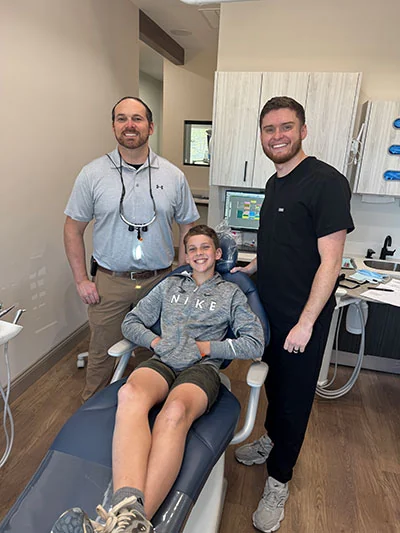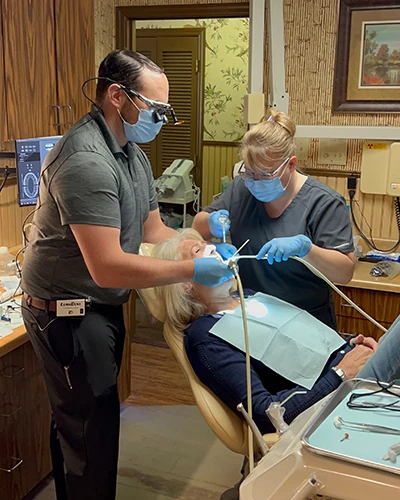When you're in need of oral surgery near Jersey, GA, you can trust Dr. Albergotti and Dr. Till to care for your smile! We have completed the advanced training required to treat various conditions and injuries with gentle, effective treatment.
Whether you have been referred to our office, you have pain or symptoms causing you concern, or you simply have questions you would like answered, please contact our office today to schedule your surgical consultation. We are here to answer your questions and provide the quality care you deserve!
The oral surgeries offered at our dental office in Jersey, GA include the following:
Tooth Extractions

Dr. Albergotti and Dr. Till can perform a variety of dental extractions, including simple extractions, surgical extractions, and the removal of wisdom teeth. After a damaged tooth is removed, they will help you determine the best tooth replacement solution to fill the gap left.
Patients may need a dental extraction for the following conditions:
- Deep decay affecting the surface and pulp of the tooth
- Extra teeth, including baby teeth that do not fall out
- Advanced periodontal disease
- Before braces treatment, to provide enough space to shift the teeth into alignment
- Fractured teeth that are beyond repair
Bone Grafting
Bone graft surgery is often closely associated with dental restorations, including bridge work and dental implant placement. Often, the success of a restorative dental procedure can depend the height, depth, and width of the jawbone at the site of the implant. When the jawbone has receded or sustained significant damage, the implant(s) cannot be supported on an unstable foundation and bone grafting is usually recommended to provide greater support for the new restoration.
There are several major factors that affect jaw bone volume:
- Periodontal Disease
- Tooth extraction, resulting in bone loss or “bone defect”.
- Dental injury or infection, causing the jawbone to recede
At Georgia Dental Studio, bone graft surgery is a highly successful procedure for most cases, acting as a preferable alternative to dental extractions and adequately increasing the height and width of the jawbone. Bone graft surgery can also help to stabilize the jawbone, correct deformities, and provide enough structure to adequately support a dental implant. Bone grafting can also be used to limit or prevent bone recession following a tooth extraction, periodontal disease, or other invasive processes. Your dentist will help you determine the best type of bone graft for your particular condition.
Wisdom Teeth Extractions
Third molars, mostly commonly referred to as wisdom teeth, are usually the last teeth to erupt in the mouth, most often making their appearance between the ages of 17 to 25. They are located at the back of the mouth (top and bottom), near the entrance to the throat.
In most cases, inadequate space in the mouth does not allow the wisdom teeth to erupt properly and become fully functional. When this happens, the tooth can become impacted (stuck) in an undesirable or potentially harmful position. If left untreated, impacted wisdom teeth can contribute to infection, damage to other teeth, and possibly cysts or tumors.
There are several types, or degrees, of impaction based on the actual depth of the teeth within the jaw:
- Soft Tissue Impaction: The upper portion of the tooth (the crown) has penetrated through the bone, but the gingiva (gum) is covering part or all of the tooth’s crown and has not positioned properly around the tooth. Because it is difficult to keep the area clean, food can become trapped below the gum and cause an infection and/or tooth decay, resulting in pain and swelling.
- Partial Bony Impaction: The tooth has partially erupted, but a portion of the crown remains submerged below the gum and surrounding jawbone. Again, because it is difficult to keep the area clean, infection will commonly occur.
- Complete Bony Impaction: The tooth is completely encased by jawbone. This will require more complex removal techniques.
While not all wisdom teeth require removal, wisdom teeth extractions are most often performed because of an active problem such as pain, swelling, decay or infection, or as a preventative measure to avoid serious problems in the future. If impaction of one or more wisdom teeth is present, and left untreated, a number of potentially harmful outcomes may occur, including:
- Damage to nearby teeth: Second molars (the teeth directly in front of the wisdom teeth) can be adversely affected by impacted wisdom teeth, resulting in tooth decay (cavities), periodontal disease (gum disease) and possible bone loss.
- Oral disease: Although uncommon, cysts and tumors can occur in the areas surrounding impacted wisdom teeth.
- Infection: Bacteria and food can become trapped under the gum tissue, resulting in an infection. The infection can cause considerable pain and danger.
- Tooth Crowding: It has been theorized that impacted wisdom teeth can put pressure on other teeth and cause them to become misaligned (crowded or twisted). This theory isn’t universally accepted by all dental professionals, and it has never been validated by any scientific studies.
Before your wisdom tooth removal at Georgia Dental Studio, your dentist will want to initially conduct a thorough examination of the wisdom teeth and surrounding teeth. Panoramic or digital x-rays will be taken in order for your dentist to evaluate the position of the wisdom teeth and determine if a current problem exists, or the likelihood of any potential future problems. Only after a thorough examination can your dentist provide you with the best options for your particular case.
Wisdom teeth removal is a common procedure, generally performed under local anesthesia, intravenous (IV) sedation, or general anesthesia by a specially trained dentist in an office surgery suite. The surgery does not require an overnight stay, and you will be released with post-operative instructions and medication (if necessary), to help manage any swelling or discomfort.
Dental Implants
Dental implants are an excellent way to replace missing teeth and also provide a fixed solution to having removable partial or complete dentures. Implants provide excellent support and stability for these dental appliances.
Dental implants are artificial roots and teeth (usually titanium) that are surgically placed into the upper or lower jaw bone by a dentist or Periodontist - a specialist of the gums and supporting bone. The teeth attached to implants are very natural looking and often enhance or restore a patient’s smile!
Dental implants are strong and durable and will last many years. On occasion, they will have to be re-tightened or replaced due to normal wear. Patients often seek dental implant restorations for the following reasons:
- Replace one or more missing teeth without affecting adjacent teeth.
- Resolve joint pain or bite problems caused by teeth shifting into missing tooth space.
- Restore a patient’s confident smile.
- Restore chewing, speech, and digestion.
- Restore or enhance facial tissues.
- Support a bridge or denture, making it more secure and comfortable.
The process of getting implants will typically require a number of visits over several months.
X-rays and impressions (molds) are taken of the jaw and teeth to determine bone, gum tissue, and spacing available for an implant. While the area is numb, the implant will be surgically placed into the bone and allowed to heal and integrate itself for up to six months. Depending on the type of dental implant, a second surgery may be required in order to place the “post” that will hold the artificial tooth in place.
After several weeks of healing, your new replacement teeth are crafted and fitted to the post portion of the anchor. Because several fittings may be required, this step may take one to two months to complete. After a healing period, the artificial teeth are securely attached to the implant, providing excellent, long-lasting stability and comfort to the patient.
At Georgia Dental Studio, patients will always receive care instructions when your treatment is completed. Proper oral hygiene and eating habits, alongside regular dental visits, will aid in the life of your new implant.
Tooth Hemisection

There are many advantages to a hemisection. Preserving as much natural tooth as possible is of paramount importance to dental professionals. There are plenty of prosthetic teeth restorations available, but none is preferable to a healthy natural tooth. Another advantage of a hemisection is that it is a cost-effective and highly predictable procedure. When a hemisection is performed, the tooth is essentially cut in half. The root and dental crown on the affected side are removed completely. There are a wide variety of circumstances that favor a hemisection, including:
- Root canal therapy failing to save the tooth
- Vertical fractures due to trauma or decay
- Vertical bone loss
- Damage to the pulp chamber
- Preventing jawbone recession or progression of gum disease recession
To determine candidacy for a hemisection, your dentist will first examine teeth to look for signs of disease and decay. X-rays will be taken to determine the exact nature of the problem below the gumline. The procedure itself will be performed under local anesthetic and generally takes around 30 minutes.
Post-Operative Instructions for Oral Surgery
When you choose Georgia Dental Studio for oral surgery, Dr. Albergotti and Dr. Till are with you every step of the way, from your consultation, through the procedure, to post-operative recovery! Your dentist will discuss with you the best ways to take care of the surgical site after your procedure to promote proper healing and the healthiest outcomes.
Our dentists typically recommend the following tips for post-operative care:
- Avoid excess rinsing of the mouth on the day of surgery. The day after surgery, rinse the mouth gently with warm salt water every few hours, especially after meals.
- Use an ice pack applied to the side of the face to control and minimize swelling immediately after surgery.
- Light, periodic bleeding for several days after oral surgery is common. Use a gauze sponge placed near the surgery site to control bleeding that may arise. Our doctors will provide further instructions on proper placement and use of the gauze.
- Take pain medication as prescribed to manage discomfort. If pain becomes severe or persistent lasting more than 3 days, contact our office.
- Maintain a proper nutritional intake following your surgery. Be sure to avoid foods that require hard chewing.
- Avoid drinking from a straw in the 3-4 days following surgery to promote proper healing and avoid the development dry socket.
Schedule Your Oral Surgery Consultation
Our dentists are proud to offer a wide range of oral surgeries to restore the teeth and help the smile heal from damage or injury. We use top technologies and digital dentistry to make oral surgery as comfortable as possible for every patient. Call today to schedule your surgical consultation!